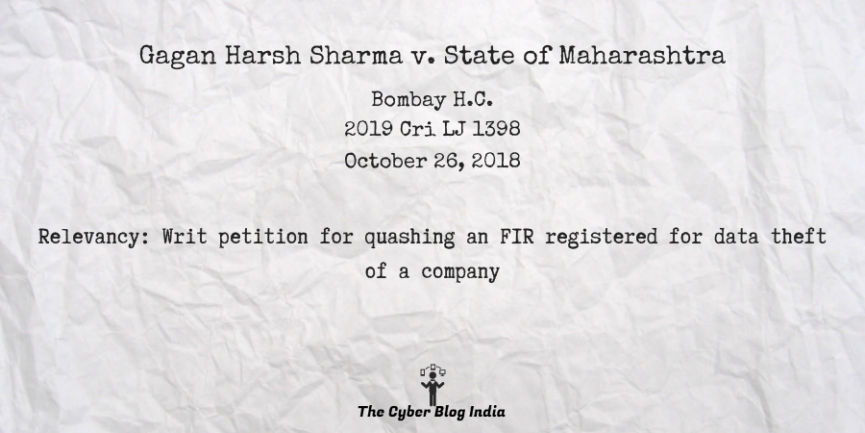Gagan Harsh Sharma v. State of Maharashtra

Gagan Harsh Sharma v. State of Maharashtra
2019 Cri LJ 1398
In the High Court of Bombay
Cri. W.P. 4361/2018
Before Justice Ranjit More and Justice Bharati H. Dangre
Decided on October 26, 2018
Relevancy of the case: Writ petition for quashing an FIR registered for data theft of a company
Statutes and Provisions Involved
- The Information Technology Act, 2000 (Section 43, 65, 66, 77A, 77B, 81)
- The Indian Penal Code, 1860 (Section 408, 420)
Relevant Facts of the Case
- This case is filed against M/s Manorama Infosolutions Pvt. Ltd., Kolhapur, a company engaged in the activity of developing healthcare software for hospital management.
- The complainant was entrusted with the supervision of the employees and had a duty to ensure that there was no violation of the bond/undertaking given by the employees. It was alleged that while he was scrutinizing the profile of one individual, he developed his own software and distributed it.
- The complainant was suspected of stealing the data and software of the company with the help of the Head of the company. On inquiry, it was revealed that the software was developed by the company and not by the individual in question and he was given access to the server as an employee of the company.
- Accused number 2 was arrested concerning the said crime. During the investigation, it was revealed that the company had entered into a deal with a company operating in Kenya providing them with the required software for the operation of their healthcare division and developed the software in question.
- The investigation further revealed that accused number 2 was manipulated and made to join the petitioners who intended to sell the said software in Africa.
- It was also revealed that the employees of the complainant’s company were given directions to use the knowledge bank and resources. Hence, the source code of necessary financial aid and the company data was transferred to the petitioners and their new company.
Prominent Arguments by the Advocates
- The petitioner’s counsel submitted that the criminal proceedings against the petitioners were misconceived. The provisions of the Information Technology Act, 2000 have been given an overriding effect to cover criminal acts contained in the Indian Penal Code, 1860 which is nothing but abuse of process of law and therefore, the counsel made a prayer for quashing of the criminal proceedings only to the extent of invocation and application of the offences punishable under the Indian Penal Code, 1860.
He further submitted that Section 43 of the Information Technology Act, 2000 read with Section 66 is sufficient to take care of the acts alleged against the present petitioners. He further submitted that the offences under the Information Technology Act, 2000, are compoundable and available. By invoking and applying the provisions of the Indian Penal Code, 1860, an attempt was made to deprive them of the benefit of bail.
- The respondent’s counsel submitted that the petitioners, by inducing the co-accused, have committed the offence and caused financial loss to the company. He relied on the latest judgment where the Hon’ble Apex Court held that there is no bar in prosecuting the persons under the Indian Penal Code, 1860 where the offences committed are cognizable and merely because the provisions in an Act constitute an offence, there is no bar to prosecuting them under the Indian Penal Code, 1860. With this backdrop, he requested for dismissal of the Writ Petition.
Opinion of the Bench
- The Information Technology Act, 2000 being a special enactment, requires an able investigation keeping in mind the purpose of the enactment and to nab the new venturing of crimes with the assistance of the Technology.
Final Decision
- Writ petition allowed.
- FIR quashed.
This case summary has been prepared by Ria Verma, an undergraduate student at Symbiosis Law School, Noida, during her internship with The Cyber Blog India in January/February 2021.
